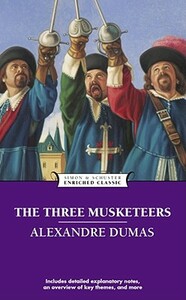Take a photo of a barcode or cover
adventurous
funny
lighthearted
medium-paced
Plot or Character Driven:
Plot
Strong character development:
No
Loveable characters:
Complicated
Diverse cast of characters:
No
Flaws of characters a main focus:
No
The elaborate, humorous, and dramatic adventures of a seventeenth-century man evading his rent. This is a novel of fashionable, armed, and moustached men not only capable of recognizing the rings and handkerchiefs bestowed by various ladies, but willing to draw swords over them too. I reread this because it was mentioned in passing by one of my favorite authors, who I am pleased to see has borrowed certain styles from this work.
I cannot speak on the translation, but Dumas' writing here is delightful. Dumas gradually introduces underlying, slowburn narratives while continuously adding swirling, shorter arcs atop that are either resolved or play into the major narratives. In practice, the protagonist is introduced with a more serious dilemma, but shortly after becomes engaged with trifling, often humorous, obstacles distracting from this mission. Only after a few of these obstacles are resolved does the narrative loop around to remind one of the original issue. This makes for eclectic, cyclical narratives that impress the drunken story of a man wandering about France wherever fate and his fancies take him.
There are elements here that would make this work unpublishable today, namely the old-fashioned chivalry paired with timeless misogyny. Dumas makes a few opening warnings about the danger of women, a theme that is not only repeated throughout, but becomes the source of the major arc as well. Affairs and the conquest of women are persistent tropes. Although d'Artagnan reflects on and aims to improve his treatment with other men, he fails to do so with women or those of lower social status. After a series of arguments, d'Artagnan swears to himself that he will henceforth act a gentleman, before proceeding to cuck his landlord, to seduce a maid in order to deceive and seduce her mistress, and to beat his own unpaid lackey. Drunkenness, gambling, and brawls are common. Less concerning are several satirical scenes regarding religion.
Surprisingly, despite these faults, this is a delightful read. The prose and dialogue are lengthy but engaging, with characters that are thoroughly dramatic and memorable.
I cannot speak on the translation, but Dumas' writing here is delightful. Dumas gradually introduces underlying, slowburn narratives while continuously adding swirling, shorter arcs atop that are either resolved or play into the major narratives. In practice, the protagonist is introduced with a more serious dilemma, but shortly after becomes engaged with trifling, often humorous, obstacles distracting from this mission. Only after a few of these obstacles are resolved does the narrative loop around to remind one of the original issue. This makes for eclectic, cyclical narratives that impress the drunken story of a man wandering about France wherever fate and his fancies take him.
There are elements here that would make this work unpublishable today, namely the old-fashioned chivalry paired with timeless misogyny. Dumas makes a few opening warnings about the danger of women, a theme that is not only repeated throughout, but becomes the source of the major arc as well. Affairs and the conquest of women are persistent tropes. Although d'Artagnan reflects on and aims to improve his treatment with other men, he fails to do so with women or those of lower social status. After a series of arguments, d'Artagnan swears to himself that he will henceforth act a gentleman, before proceeding to cuck his landlord, to seduce a maid in order to deceive and seduce her mistress, and to beat his own unpaid lackey. Drunkenness, gambling, and brawls are common. Less concerning are several satirical scenes regarding religion.
Surprisingly, despite these faults, this is a delightful read. The prose and dialogue are lengthy but engaging, with characters that are thoroughly dramatic and memorable.
adventurous
lighthearted
medium-paced
Plot or Character Driven:
Plot
Strong character development:
No
Loveable characters:
Yes
Diverse cast of characters:
No
Flaws of characters a main focus:
No
adventurous
dark
mysterious
tense
medium-paced
Plot or Character Driven:
Plot
Strong character development:
No
Loveable characters:
Complicated
Diverse cast of characters:
No
Flaws of characters a main focus:
No
Moderate: Confinement, Death, Kidnapping, Suicide attempt, Murder, Alcohol, War
Minor: Rape, Blood
It took awhile for me to really get into this book after reading The Count of Monte Cristo. It really felt like it was written by a different author. Once I realized that it was more of a swashbuckling comedy it was a lot more enjoyable. I was really taking it too seriously at the beginning and I hated D'Artagnan. He matures throughout the story which made me start to enjoy his character more. It took about a third of the book to get to the point where I didn't want to set the book aside any more. Overall a fun read after getting over my initial disinterest.
adventurous
funny
medium-paced
Plot or Character Driven:
A mix
Strong character development:
Yes
Loveable characters:
Yes
Diverse cast of characters:
No
Flaws of characters a main focus:
Yes
adventurous
funny
medium-paced
Plot or Character Driven:
Plot
Strong character development:
No
Loveable characters:
Yes
Diverse cast of characters:
Yes
Flaws of characters a main focus:
No
"The Three Musketeers" is a historical novel written by French author Alexandre Dumas, first published in 1844. Set in the early 17th century in France, the novel follows the adventures of young d'Artagnan, who sets out to join the legendary Musketeers of the Guard and becomes embroiled in political intrigue, romance, and duels.
One of the strengths of the novel is its well-developed and memorable characters. The titular Three Musketeers - Athos, Porthos, and Aramis - are portrayed as loyal, brave, and witty, each with their unique personalities and quirks. The character of d'Artagnan, a hot-headed but courageous young man, is also well-drawn and relatable, making the reader root for him throughout the story.
The novel's plot is fast-paced and full of action, with plenty of duels, sword fights, and battles. The political intrigue and betrayal that d'Artagnan becomes embroiled in add further tension and excitement to the story.
Another strength of the novel is its portrayal of French history and culture. Dumas's vivid descriptions of the city of Paris and the royal court bring the setting to life, while his references to historical events and figures provide a deeper understanding of the time period. The novel also explores themes such as loyalty, honor, and the price of power, making it a thought-provoking read.
The novel's romance subplot is also notable, as d'Artagnan falls in love with the beautiful Constance Bonacieux and must fight to protect her from harm. Their relationship is both tender and passionate, adding a touch of romance to the otherwise action-packed story.
Overall, "The Three Musketeers" is a classic work of literature that continues to captivate readers today. Its memorable characters, exciting plot, and vivid historical setting make it a must-read for anyone interested in adventure, romance, and French history and culture.
One of the strengths of the novel is its well-developed and memorable characters. The titular Three Musketeers - Athos, Porthos, and Aramis - are portrayed as loyal, brave, and witty, each with their unique personalities and quirks. The character of d'Artagnan, a hot-headed but courageous young man, is also well-drawn and relatable, making the reader root for him throughout the story.
The novel's plot is fast-paced and full of action, with plenty of duels, sword fights, and battles. The political intrigue and betrayal that d'Artagnan becomes embroiled in add further tension and excitement to the story.
Another strength of the novel is its portrayal of French history and culture. Dumas's vivid descriptions of the city of Paris and the royal court bring the setting to life, while his references to historical events and figures provide a deeper understanding of the time period. The novel also explores themes such as loyalty, honor, and the price of power, making it a thought-provoking read.
The novel's romance subplot is also notable, as d'Artagnan falls in love with the beautiful Constance Bonacieux and must fight to protect her from harm. Their relationship is both tender and passionate, adding a touch of romance to the otherwise action-packed story.
Overall, "The Three Musketeers" is a classic work of literature that continues to captivate readers today. Its memorable characters, exciting plot, and vivid historical setting make it a must-read for anyone interested in adventure, romance, and French history and culture.
American Psycho describes the life of a horrible person. The protagonist in AP is ruthless, cruel and very sadistic. He murders and rapes countless women throughout the whole book. I believe that Patrick Bateman is a piece of shit and so does Brett Easton Ellis. But what does Bateman have to do with The Three Musketeers? A book written centuries ago? On our introduction to D'Artagnan we are told that he is basically a young Don Quixote and the young lad appears to be so. He is full of zeal, honorable and a very good swordsman. But throughout the book he rapes murders and steals. And so do the other Musketeers. But Alexander Dumas does NOT consider them evil. Or does he? I dont know there is not a definitive answer to this, their evil deeds are basically ignored by everyone except the antagonist of the story who was raped and almost murdered by two of the four musketeers. I think that Dumas did NOT want me to root for her, I think he wanted me to root for the protagonists. Which I didnt. If the moral of the story is that even men hailed as musketeers can balance between being noble and being misanthropes then this is a wonderful book. If this is a book about the noble adventures of D'Artagnan and friends then this is a bad book.
adventurous
funny
medium-paced
Plot or Character Driven:
A mix
Strong character development:
No
Loveable characters:
Yes
Diverse cast of characters:
No
Flaws of characters a main focus:
Yes
I actually really enjoyed this. It's of course too long (typical for one of these serialized novels, especially if you're not reading it in the same way) and it's old, but I thought it was absolutely hilarious at times how foolish/irresponsible the musketeers were (making enemies left and right). This is classic comedy and not much more than that, but it doesn't have to be.
Surprisingly (maybe not, given the inclusion of lesbians in The Count of Monte Cristo), this passes the Bechdel test. Milady is the master of gaslight gatekeep girlboss. Iconic.
Surprisingly (maybe not, given the inclusion of lesbians in The Count of Monte Cristo), this passes the Bechdel test. Milady is the master of gaslight gatekeep girlboss. Iconic.






